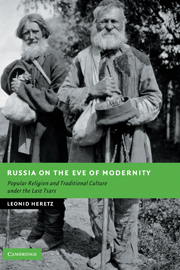Book contents
- Frontmatter
- Contents
- Acknowledgments
- Introduction
- 1 The traditional worldview
- 2 The Old Believers: modernization as apocalypse
- 3 The sectarians: dualism and secret history
- 4 Folk eschatology
- 5 The assassination of Alexander II (1881) and folk Tsarism
- 6 The year of famine and cholera (1891–1892): demonization of the nobility
- 7 The Japanese War: peasant Russia and the wider world
- 8 1905: revolution or reaction?
- 9 The Great War and the crisis of the traditional culture
- Epilogue
- Bibliography
- Index
- NEW STUDIES IN EUROPEAN HISTORY
7 - The Japanese War: peasant Russia and the wider world
Published online by Cambridge University Press: 23 December 2009
- Frontmatter
- Contents
- Acknowledgments
- Introduction
- 1 The traditional worldview
- 2 The Old Believers: modernization as apocalypse
- 3 The sectarians: dualism and secret history
- 4 Folk eschatology
- 5 The assassination of Alexander II (1881) and folk Tsarism
- 6 The year of famine and cholera (1891–1892): demonization of the nobility
- 7 The Japanese War: peasant Russia and the wider world
- 8 1905: revolution or reaction?
- 9 The Great War and the crisis of the traditional culture
- Epilogue
- Bibliography
- Index
- NEW STUDIES IN EUROPEAN HISTORY
Summary
In 1904, Russia was confronted with war, the third element alongside pestilence and famine in the trinity of recurring great events which punctuate the history of a traditional people. Naturally, the Japanese War was a matter of tremendous interest to the Russian peasantry, as hundreds of thousands of village youth were sent by the sovereign will of the Tsar to fight in distant lands. Popular responses to the war offer insights into a number of important topics: the flow and assimilation of new information into the traditional culture, the perception of foreign countries and the projection of folk values and concerns onto them, and the traditional understanding of “power politics” – how rulers go about their sovereign business, the causes of hostilities between peoples, the reasons for the success or failure of armies, and the consequences of victory or defeat. Popular attitudes toward the war reveal a number of salient characteristics of the traditional mind at the beginning of the twentieth century: (1) an agitated mental state, with an unusually high degree of interest in events in the outside world, (2) a notion (the prevalence of which is difficult to ascertain, but which is nevertheless interesting as a reflection of popular attitudes) that the East (specifically: China) might play an epochal role in the fate of (peasant) Russia, (3) a strongly Tsarist/patriotic emotional stance, showing the continued vitality of the traditional understanding of legitimate authority, and (4) an acute alertness for the workings of the forces of evil, leading to an obsession with espionage and treason, associated, like all bad things, with the “lords.”
- Type
- Chapter
- Information
- Russia on the Eve of ModernityPopular Religion and Traditional Culture under the Last Tsars, pp. 145 - 156Publisher: Cambridge University PressPrint publication year: 2008

